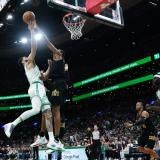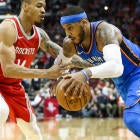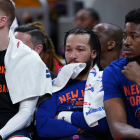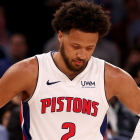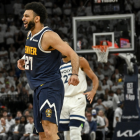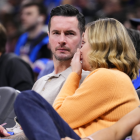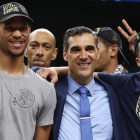Trades are still possible, Clint Capela is in limbo there are a few other mildly interesting free agents searching for a new team. Other than that, the wild and weird 2018 offseason is over. As expected, news came out Monday that Carmelo Anthony plans to join the Houston Rockets, a partnership that somehow seems obvious and risky at the same time. Here's a look at how that might and might not work, plus a look around the NBA.
Can Melo help the Rockets as much as they can help him?
If I'm trying to be optimistic about Anthony in Houston, I think about Luc Mbah a Moute. The 31-year-old defensive specialist stretched his wings last year with the Rockets, looking more aggressive on offense than at any other time in his 10-year NBA career. Look at all these drives:
My favorite clip in there is the second one, in which he calls for a clear-out against Doug McDermott. You are forgiven if you thought Mbah a Moute had never done such a thing as a professional, but the evidence is right there: He told center Tarik Black to get out of the way, then hit McDermott with a crossover, attacked the basket and finished off the glass.
Mbah a Moute felt the freedom to do this partially because he played for an empowering coach, Mike D'Antoni. The other, more important part of it is the spacing. Mbah a Moute didn't all of a sudden turn into the type of player who would routinely dribble into crowds; that will never be his game. He simply realized that, with shooters surrounding him, he was good enough to make one-on-one plays with little danger of help defenders bothering him.
This is the confidence that comes with playing for the Rockets. Not only are you given freedom to make plays, you are playing in an environment where playmaking is easier than elsewhere. The pristine spacing is what separates their isolation-heavy attack from the ISO-ball of the late 90s and early 2000s.
If this can make Mbah a Moute a threat with the ball in his hands, it is not far-fetched to imagine it revitalizing Anthony. He should be a much more efficient scorer than he was with the Thunder, and, in a simple system like D'Antoni's, he might even be able to rack up some assists again. He will never again be the star of the show like he was with the Knicks and Nuggets, but as long as he understands what he's there for, he could remind people of the days when defenders dreaded being matched up with him.
It is less clear how Anthony helps the Rockets in the big picture. The best thing he brings is the ability to punish switching defenses in the playoffs -- opponents will not want to put a small guard on him in the post. Houston was already a top-notch offense, though, and giving him the ball in situations where Chris Paul, James Harden or Eric Gordon would have otherwise had it isn't necessarily going to make it more efficient.
If Anthony was a good defender, however, I wouldn't be all that worried about the fit. In the playoffs, it is hard to argue against having multiple playmakers on the court, as long as they can all stretch the floor. It will be incredibly difficult for opponents to hide weak defenders against Houston, and I'll bet Anthony will be a solid pick-and-pop partner for both of its Hall of Fame guards.
Of course, Anthony has never been a good defender. At his very best, he was inconsistent in terms of effort and activity level. Last season, he was at his worst, causing problems with his poor help defense and abysmal pick-and-roll defense. No one knew this better than the Rockets, who targeted him without mercy whenever they played against him. At 34 years old, there is little reason to expect him to suddenly become an aggressive, disruptive or even non-harmful defender.
The question is whether or not Houston can limit the damage Anthony does. Assistant coach and defensive coordinator Jeff Bzdelik had the luxury of teaching a switching system to a team that had P.J. Tucker, Trevor Ariza and Mbah a Moute -- three virtuosos -- on the roster last season. Now he has to try to push Anthony into at least understanding the concepts and executing them with effort, the way that Ryan Anderson did.
Anderson, by the way, barely saw the floor in the playoffs, despite being able to space the floor to 30 feet. Regardless of what roster moves the front office makes between now and May, D'Antoni is going to have some difficult decisions to make when balancing offense and defense in the postseason.
My take: Individually, Anthony will look more like Olympic Melo than he did with the Thunder, and he'll have fun winning tons of games in the regular season. If I was the Golden State Warriors, though, I'd be only moderately concerned about him catching fire in the second quarter of a conference finals game.
Do the Spurs still deserve the benefit of the doubt?
As long as we're concern-trolling about defense, let's talk about the San Antonio Spurs. Two years ago, I was in awe of how Gregg Popovich coaxed the best defense in the league out of a team that featured two traditional bigs and numerous old guards in the rotation. Last season, I was amazed that they remained fourth in defensive rating despite Kawhi Leonard only playing nine games.
Popovich devotees will tell you that this shows that defense is more about coaching than personnel, more about execution than elite talent, at least in the regular season. This season will be a true test of this theory, and not just because DeMar DeRozan has a poor defensive reputation.
San Antonio essentially replaced Danny Green and Kyle Anderson with Marco Belinelli and DeRozan this summer. Belinelli is an awful defender and has been for 11 years. I am as intrigued as anybody about how DeRozan might evolve with the Spurs, but I'd be shocked if he reached Green's level. Anderson was also solid on that end despite being one of the slowest players in the league. This is a massive defensive downgrade on the wing, and it might not be possible have an elite defense in today's NBA without at least a couple of above-average wing defenders. San Antonio might have zero.
Ever since Tim Duncan left, the culture of the Spurs has been slowly eroding. This was inevitable, and they are undeniably going to look different without Leonard and Tony Parker (and Manu Ginobili, perhaps) next season. What's up in the air is just what that means for them on the court. Should we pencil them in for 50 wins on the strength of a disciplined, smart defense simply because they're the Spurs?
A quick thought experiment: If the Los Angeles Clippers or Nuggets had this roster, how many games would you predict they'd win? The West is tough as hell, and I'm more than a little bit skeptical that San Antonio will do what it has always done.
The Raptors live in a world of possibility
More than any reshaped team this summer, it's fun to play around with Toronto's lineups. They will have units where the shortest player is 6-foot-5 Delon Wright and the tallest is 6-foot-9 Pascal Siakam. They can play two traditional bigs together. They can play two 6-foot-nothing point guards together. They can match up with Boston's trio of Gordon Hayward, Jayson Tatum and Jaylen Brown with Leonard, O.G. Anunoby and Green. Versatility and switchability are requirements nowadays, and the Raptors are suddenly ridiculously versatile and switchable. They can play any style they want.
In this respect, Nick Nurse must be elated. Last week I wrote that he is not afraid to get weird, and a roster like this deserves a coach who will be creative. I want to see Fred VanVleet and Leonard pressuring ballhandlers as much as humanly possible. I want to see Siakam, a point forward in training, run inverted pick-and-rolls with shooters. I want to see the Raptors push the pace like they couldn't do in the DeRozan era.
If Leonard is healthy and himself, he's the best player in the East. Simply by adding him, Toronto's spacing will be improved and its defense should be sturdier in the playoffs. The fascinating part is how else the Raptors will change -- what will their shot profile look like? How many turnovers will they force? How will the young players develop? With Nurse trying a bunch of different things throughout the regular season, they will likely look different in May than in October. For a team that had been accused of growing stale, this is exciting.
Also, it seems like Toronto finally has the "it" factor that Paul Pierce talked about three years ago.
Little guy, big demotion
Isaiah Thomas talked to ESPN's Adrian Wojnarowski about signing with Denver for the minimum, and he said he's "not worried about starting or coming off the bench," only "playing well and showing the world who I am again." That is the right thing to say, especially after Nuggets coach Michael Malone told him he will definitely not be starting over 21-year-old Jamal Murray. I just wonder if he'll remain happy with this arrangement.
Thomas is a prideful player, and long before the tragedy and injury he endured at the end of his remarkable run with the Boston Celtics, he showed he could carry an efficient offense even with questionable teammates. Over and over, the Sacramento Kings started inferior players -- Jimmer Fredette, Aaron Brooks and Greivis Vasquez -- at point guard in front of him. That's why, after the Phoenix Suns impressed him in a free-agent meeting and acquired him in the summer of 2014, he was so frustrated when he found himself competing for minutes with Goran Dragic and Eric Bledsoe.
I will never forget how upset Thomas sounded when he played 22 minutes in a close loss in Toronto that November. He knew the coaches were in a difficult position, but he just couldn't stomach that amount of playing time when he felt so good about his game.
"As long as I'm in the game, I'm happy," Thomas said back then. "That's the biggest thing. I know everybody wants to play. I feel like I can help this team in a big way."
Thomas averaged 25.7 minutes in his 46 games with Phoenix. Is there any chance that number is higher with the Nuggets? Becoming a backup might have been Thomas' only real option this offseason, and Denver could fit him quite well, but as long as there are no major backcourt injuries, his biggest challenge will be accepting a role that he thought he had outgrown.
It's clear that Thomas has told himself that thriving as a sixth man will mean only spending one season as a sixth man. That is easy to say right now, but will he have that same perspective after sitting on the bench down the stretch of a tight game and watching the Nuggets lose?
What are the Bucks?
Milwaukee might be the NBA's most fascinating team. Giannis Antetokounmpo has yet to experience a 45-win season or the second round of the playoffs. Khris Middleton (player option), Eric Bledsoe (unrestricted) and Malcolm Brogdon (restricted) can be free agents next summer. No one knows exactly what the Bucks will look like under Mike Budenholzer, but the pressure is on.
Aside from the Budenholzer hire, it has been a relatively uninspiring summer for the franchise. It overpaid for Ersan Ilyasova and underpaid for Brook Lopez. It let Jabari Parker walk, a totally logical decision that still felt crappy because he was drafted No. 2 overall four years ago. Bledsoe is still around despite being a questionable fit under Budenholzer and having a horrid playoff performance. The contracts of Tony Snell, Matthew Dellavedova and John Henson are all still on the books. Rookie Donte DiVincenzo could be interesting.
There is a world in which this is all fine and Milwaukee gets home-court advantage in the playoffs. Ilyasova and Lopez are Budenholzer-y players and their shooting will provide Antetokounmpo with room to operate. Brogdon was injured for most of last season and should be better this time around. The development of Sterling Brown and Thon Maker will be worth watching.
It's just hard not to see downside here, too. Everybody is going to pick the Bucks to finish fourth, and there is no guarantee that Budenholzer will be able to turn this collection of players into more than the sum of its parts right away. There might not be enough passing here to duplicate the success of his best Hawks teams, and management doesn't have the flexibility to fix potential problems because of the way resources have been allocated for the past few years.
Has everybody really learned from 2016?
Almost every team in the league is positioning itself for the summer of 2019, when star players like Leonard, Kevin Durant, Kyrie Irving, Jimmy Butler, Kemba Walker, Klay Thompson, DeMarcus Cousins, Marc Gasol and Kevin Love could be on available in free agency. Beyond those guys, there is a second tier of potential free agents that includes players like Middleton, Tobias Harris, Goran Dragic and Derrick Favors.
There will surely be tons of player movement, and it looks like it will be less of a team-friendly market than it was this summer. It is too early, however, to know exactly how this will play out. On the one hand, 2016 taught teams how they can set themselves back for years by committing long-term money to the wrong free agents. On the other, when you have cap space, it is difficult not to use it.
One variable that has changed: The amount of players in the free-agent pool. More than half of this summer's signings were for just a year, meaning the market will be more crowded than expected. This probably will not change much for the players in the first and second tiers, but what if you're Ricky Rubio, Spencer Dinwiddie or Taj Gibson? What if you're an upcoming restricted free agent like Stanley Johnson, Kelly Oubre or Terry Rozier and your agent is trying to negotiate an extension between now and the start of the season?
These calculations are always complicated, but it's particularly tricky to project what sensible salaries will look like a year from now.








